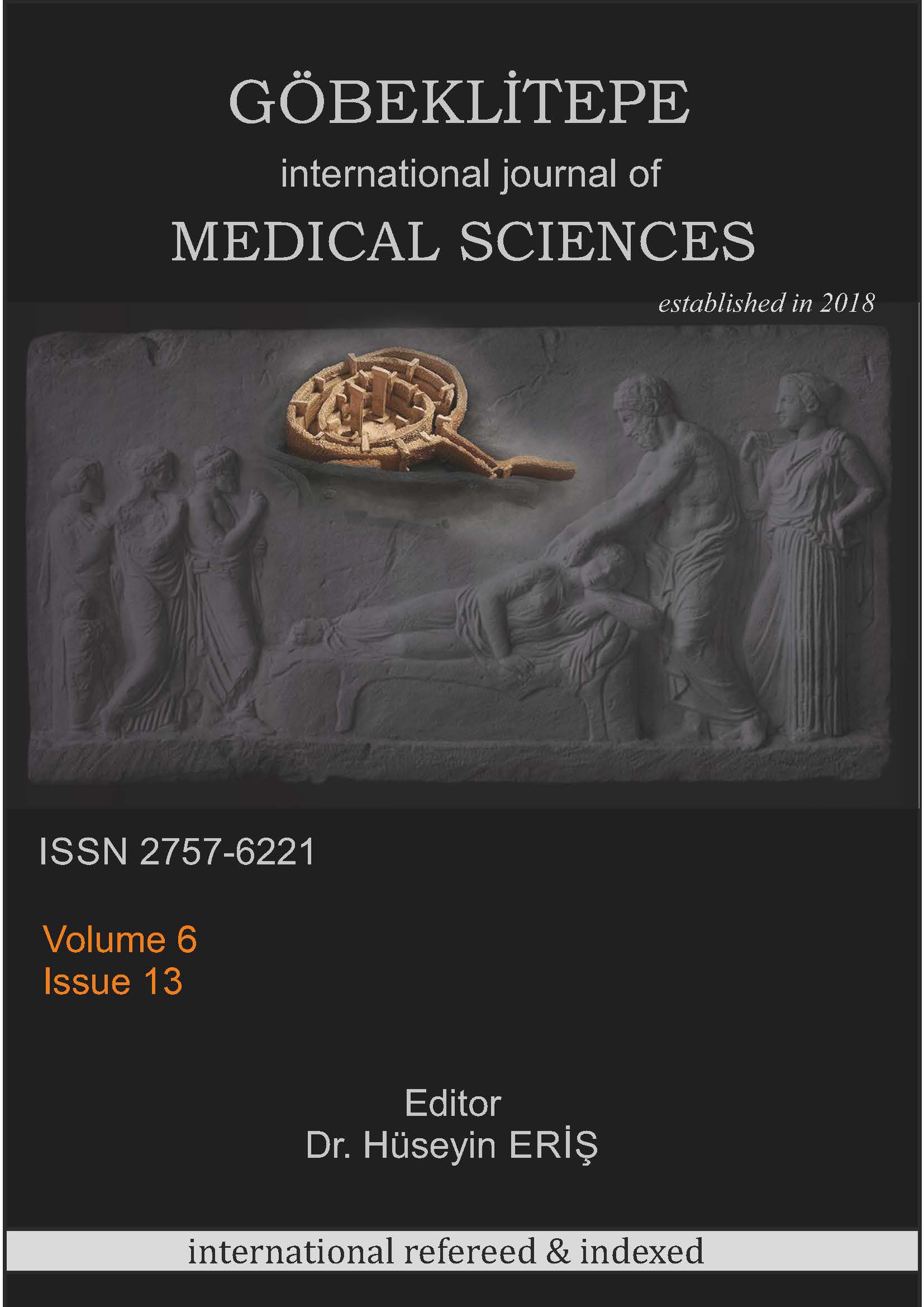IDENTIFICATION OF SOURCES OF CONCERN ABOUT ILLNESS AND HOSPITALIZATION IN SCHOOL-AGE CHILDREN WITH ONCOLOGICAL DISEASES
DOI:
https://doi.org/10.55433/gsbd/214Keywords:
School Age, Oncological Disease , AnxietyAbstract
The aim of this study was to determine the sources of anxiety about illness and hospitalization of school-age children with oncological disease. The sample of the descriptive study conducted at a University Hospital consisted of 102 children. Data were collected by face-to-face interview method using the “Data Collection Form” and the “Scale of Worry of School Age Children with Oncological Diseases”. It was determined that the mean age of the children was 9.43±2.28, 54.9% were male, and 41.2% were diagnosed with oncological disease for more than 3 years. It was determined that of the children, 48.0% could not attend school due to their disease, 72.5% were diagnosed with ALL, 79.4% had recurrences during hospitalization, 5.9% had metastasis, and 71.6% received chemotherapy. The mean score of the School Age Children with Oncological Diseases on the Sources of Worry Scale was found to be 67.84±20.44. Compared to children aged 6-9 compared to children aged 10-12, children whose fathers are primary school graduates, and children whose fathers are high school or university graduates, children diagnosed with lymphoma compared to children diagnosed with ALL, brain tumor and sarcoma, School Age Children with Oncological Disease Sources of Worry Scale mean score was found to be significantly higher. As a result, we can say that children with oncological problems are anxious and age, diagnosis and father education are effective in children's anxiety.
References
World Health Organization (WHO). International Childhood Cancer Day: Questions & Answers. Erişim tarihi:18.06.2023 erişim linki: https://www.iarc.who.int/cancer-type/childhood-cancer/
Yıldız Akkuş S, Bütün Ayhan A. Kronik hastalığı olan çocukların davranışlarının ve yaşam kalitelerinin incelenmesi. Türkiye Çocuk Hast Derg/Turkish J Pediatr Dis. 2020;14:129-135
Gültekin G, Baran G. 9-14 yaş grubu akut ve kronik hastalığı olan çocukların denetim odağı düzeylerinin incelenmesi. Türk Pediatri Arşivi. 2005; 40(3):211-220.
Özbaran B, Erermiş S. Kanser tedavisi gören çocuk ve gençlerde uzun süreli izlem sürecinde psikososyal özelliklerin tanımlanması ve genel yaklaşım ilkeleri. Klinik Psikiyatri. 2006;9(4):185-190.
Serindağ S. Onkolojik Hastalığı Olan Okul Yaş Dönemi Çocukların Hastalık ve Hastaneye Yatma Durumunda Endişe Kaynakları Ölçeğinin Geliştirilmesi. Yüksek Lisans Tezi. Gaziantep Üniversitesi 2008.
Üstün G, Erşan E, Kelleci M, Turgut H. Hastanede yatan çocuklarda psikososyal semptomların bazı değişkenler açısından incelenmesi. Cumhuriyet Medical Journal 2014;36(1):25-33.
Gönener D, Pek H. Okul Yaş Dönemi Çocuğu Olan Ebeveynlerin Hastalık ve Hastaneye Yatma Durumunda" Ebeveynlerin Endişe Kaynakları Ölçeği" nin Geliştirilmesi ve Çocukların Endişe Kaynakları ile Etkileşimi. Gaziantep Medical Journal 2009;15(1):31-40.
Gönener D. Okul yaş grubu çocukların hastane ve hastalığı ile ilgili bilgilendirme durumlarının endişe kaynakları ile etkileşimi. Gaziantep Medical Journal 2009;15(1);41-48.
Guler S, Cabar H. D. Improvement of anxiety resources scale of school-age children with oncological disease under condition of illness and hospitalization. HealthMED 2012;3378-3384.
TC. Sağlık Bakanlığı Sağlık İstatistikleri 2021. Erişim tarihi:20.06.2023 erişim linki: https://dosyasb.saglik.gov.tr/Eklenti/45316,siy2021-turkcepdf.pdf?0
Ayhan Balık C.H, Buzlu S. Onkolojik problemi olan çocuk ve ailesine psikososyal yaklaşımlar. Journal of Academic Research in Nursing (JAREN) 2020;6(3):592-7.
Sezgin S, Ekinci M, Okanlı A. Kanserli çocukların yaşadıkları psikososyal problemler ve hemşirelik yaklaşımları. Journal of Experimental and Clinical Medicine 2009;24(3):107-12.
Er M. Çocuk, hastalık, anne-babalar ve kardeşler. Çocuk Sağlığı ve Hastalıkları Dergisi 2006;49(2):155-68.
Kurtz BP, Abrams AN. Psychiatric aspects of pediatric cancer. Child Adolesc Psychiatr Clin N Am 2010;19(2):401-21.
Alderfer MA, Long KA, Lown EA, Marsland AL, Ostrowski NL, Hock JM, et al. Psychosocial adjustment of siblings of children with cancer: a systematic review. Psychooncology 2010;19(8):789-805.
Linder, L. A., & Seitz, M. (2017). Through their words: Sources of bother for hospitalized children and adolescents with cancer. Journal of Pediatric Oncology Nursing, 34(1), 51-64.
Compas B.E, Desjardins L, Vannatta K, Young-Saleme T, Rodriguez E.M, Dunn, M, Bemis, H, Snyder S, Gerhardt C.A. Children and adolescents coping with cancer: Self- and parent reports of coping and anxiety/depression. Health Psychology. 2014;33(8);853–861.
Lopes VJ, Mercês NNA, Sartor SF, Souza MAR, Silva LAGP. Effects of Cancer Treatment on the Comfort of Children and Adolescents with Cancer: A Scoping Review. Aquichan. 2022;22(4):2244.
Van Dijk-Lokkart EM, Braam KI, Kaspers GJ, van Dulmen den Broeder E, Takken T, Grootenhuis MA, et al. Applicability and evaluation of a psychosocial interven tion program for childhood cancer patients. Support Care Cancer 2015;23(8):2327-33.
Derman YE, Deatrick JA. Promotion of well-being during treatment for childhood cancer: A literature review of art interventions as a coping strategy. Cancer Nurs 2016;39(6):E1-E16.
Helms AS, Schmiegelow K, Brok J, Johansen C, Thorsteinsson T, Simovska V, et al. Facilitation of school re‐entry and peer acceptance of children with cancer: a review and meta‐analysis of intervention studies. Eu J Cancer Care 2016;25(1):170-179.
Bossert E. . Stress appraisals of hospitalized school-age children. Children's Health Care, 1994;23(1):33-49.
Downloads
Published
Versions
- 2024-07-02 (2)
- 2023-09-20 (1)
How to Cite
Issue
Section
License
Copyright (c) 2023 Göbeklitepe Sağlık Bilimleri Dergisi

This work is licensed under a Creative Commons Attribution 4.0 International License.




